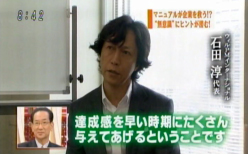Jun Ishida - Changing the Way Japan Works
 In its ongoing mission to disseminate positive behavioral methods to organizations worldwide, ADI formed its first strategic alliance in Asia with Jun Ishida, founder of Will PM, in Japan. Will PM, a training organization based in Tokyo, currently teaches an expanding clientele—including international cosmetics firm Shiseido and subsidiaries of Panasonic—the technology of behavior-based management (or as is known in the science community, applied behavior analysis). However, 14 years ago when Ishida first began his career as a business owner, he wasn’t familiar with behavioral science.
In its ongoing mission to disseminate positive behavioral methods to organizations worldwide, ADI formed its first strategic alliance in Asia with Jun Ishida, founder of Will PM, in Japan. Will PM, a training organization based in Tokyo, currently teaches an expanding clientele—including international cosmetics firm Shiseido and subsidiaries of Panasonic—the technology of behavior-based management (or as is known in the science community, applied behavior analysis). However, 14 years ago when Ishida first began his career as a business owner, he wasn’t familiar with behavioral science.
As he explains it, “I first learned about behavior analysis in the course of attempting to improve our own management practice and business performance. I got interested in the science when I met Dr. Toshio Asano, a professor of psychology at Aichi University, at the Japanese Association for Behavior Analysis (J-ABA) conference. While most Japanese companies had a tendency to use management methods driven by individual mental strength and seniority, I found the behavior-based management far more attractive and powerful because of its scientific foundation.”
Ishida became so intrigued that he began reading and studying the methods of behavioral management. He also began applying positive behavioral principles with employees of his company Will Educate School who work with about 30 directly managed schools. His association with Dr. Asano eventually led to his introduction to Dr. Darnell Lattal, President & CEO of Aubrey Daniels International (ADI), and then to discussions of forming an alliance.
 Today, as Director at the Institution of Behavioral Science Management and CEO of Will PM International, Inc., Ishida has become one of Japan’s top-selling business authors. In fact, he has written 23 books in the past five years! Ishida’s books detail the applications of behavioral principles in areas ranging from academic performance, to sales, to safety—even housekeeping. His favorite publication so far, if he has to choose one, carries the translated title of You Can Change the Organization in a Short Period of Time. His books are not yet available in English, but have also gained increasing popularity in China, Korea, and Taiwan. “I write using language that is easier to understand for the general public. I think that is one of the keys to the books’ success,” he says, and then adds, “My main message to my readers is that the key to their business success is to focus on behaviors.” Ishida’s message to readers coincides with the mission of Will PM which he states as, “Showing the effectiveness of behavior-based management and organizational safety management to a larger population.” Because of issues of workplace stress in Japan, he also co-authored a book last fall with Dr. Lattal on reducing stress through strategies of positive reinforcement to motivating worker productivity and designing in positive cultures of work.
Today, as Director at the Institution of Behavioral Science Management and CEO of Will PM International, Inc., Ishida has become one of Japan’s top-selling business authors. In fact, he has written 23 books in the past five years! Ishida’s books detail the applications of behavioral principles in areas ranging from academic performance, to sales, to safety—even housekeeping. His favorite publication so far, if he has to choose one, carries the translated title of You Can Change the Organization in a Short Period of Time. His books are not yet available in English, but have also gained increasing popularity in China, Korea, and Taiwan. “I write using language that is easier to understand for the general public. I think that is one of the keys to the books’ success,” he says, and then adds, “My main message to my readers is that the key to their business success is to focus on behaviors.” Ishida’s message to readers coincides with the mission of Will PM which he states as, “Showing the effectiveness of behavior-based management and organizational safety management to a larger population.” Because of issues of workplace stress in Japan, he also co-authored a book last fall with Dr. Lattal on reducing stress through strategies of positive reinforcement to motivating worker productivity and designing in positive cultures of work.
 Of course, with the recent tragedies brought by the 2011 tsunami and the subsequent nuclear plant crises, safety is a critical subject for all of Japan’s citizenry. Ishida has witnessed and experienced personal loss from the deaths of fellow citizens and employees and remains actively involved in public service and providing aid to those affected by the disaster, especially children. Since Ishida regularly appears on television and in the media discussing the merits of behavioral applications, he enthusiastically anticipates an upcoming visit by Dr. Aubrey Daniels. Daniels will present leadership principles and discuss relevant experiences regarding the nuclear industry and safety.
Of course, with the recent tragedies brought by the 2011 tsunami and the subsequent nuclear plant crises, safety is a critical subject for all of Japan’s citizenry. Ishida has witnessed and experienced personal loss from the deaths of fellow citizens and employees and remains actively involved in public service and providing aid to those affected by the disaster, especially children. Since Ishida regularly appears on television and in the media discussing the merits of behavioral applications, he enthusiastically anticipates an upcoming visit by Dr. Aubrey Daniels. Daniels will present leadership principles and discuss relevant experiences regarding the nuclear industry and safety.
 Behavior-based safety (BBS) is going to be playing an important role in Japan,” Ishida explains. “Publications on BBS, co-hosted seminars on this topic with Nikkei (one of Japan’s largest newspaper companies), and a two-day conference with Dr. Aubrey Daniels as an invited and featured speaker (which we are now planning to hold in Tokyo and Osaka later this year) will enhance its visibility all over the nation. The basic elements of BBS, such as focusing on behaviors and changing behaviors to develop habit strength, should work well for most Japanese companies. Of course, we have risk management, but in Japan it is more of a slogan. It isn’t attached to practical behavior.”
Behavior-based safety (BBS) is going to be playing an important role in Japan,” Ishida explains. “Publications on BBS, co-hosted seminars on this topic with Nikkei (one of Japan’s largest newspaper companies), and a two-day conference with Dr. Aubrey Daniels as an invited and featured speaker (which we are now planning to hold in Tokyo and Osaka later this year) will enhance its visibility all over the nation. The basic elements of BBS, such as focusing on behaviors and changing behaviors to develop habit strength, should work well for most Japanese companies. Of course, we have risk management, but in Japan it is more of a slogan. It isn’t attached to practical behavior.”
As an entrepreneur, educator, and writer, Ishida obviously takes what he considers a good idea and runs with it, even literally. Ishida uses behavioral techniques when training for his hobby of running marathons and triathlons. His next scheduled “ultimate marathon” requires completing a trek of 100 kilometers (more than 62 miles) within a time limit of 13 hours. “Every day I record how much I practice, graph my data, and use it as a tool to continue my practice,” he states.
A steady increase in workforce mobility, a falling birthrate, a younger labor force, and a need to increase productivity—all are factors that Ishida sees as upfront issues facing his country’s business community. “This is a really good time and opportunity to penetrate the Japanese market and introduce the practical idea of behavior-based safety and behavioral management,” he concludes.
Published May 24, 2011


